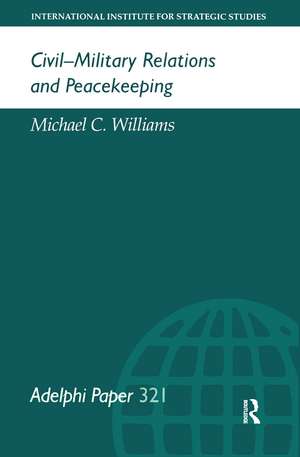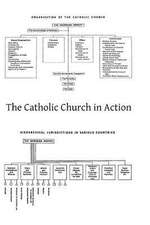Civil-Military Relations and Peacekeeping: Adelphi series
Autor Michael Williamsen Limba Engleză Paperback – aug 1998
At the strategic level:
* mandates must be clear, and must respond both to the needs of the situation and to the resources available
* there must be regular dialogue between all the principal players, military and civilian;
the military-staff capacity at UN headquarters should be made more effective, and should be responsible to the Security Council
* major troop-contributing countries should be systematically involved in determining mandates, as well as in reviewing operational plans
* senior military officers from all large troop-contributing countries should be based at a mission’s field headquarters.
At the operational level:
* the office of the Special Representative of the Secretary-General – the head of a UN peacekeeping mission – should be strengthened. In non-UN operations, the authority of the High Representative needs to be increased
* a cadre of civilian officials with peacekeeping experience needs to be developed;
standard operating procedures for the civilian head of a mission to follow when dealing with the military need to be developed
* greater emphasis should be placed on the ‘softer’ aspects of military science – managing resources, civilian control and human rights
* the reluctance of civilians and non-governmental organisations to engage with the military should be addressed.
Much experience has been gained from the peacekeeping operations of the 1990s, but both military and civilian participants must make considerably more progress before they can be said to have forged a partnership that makes them an effective intervention force
Din seria Adelphi series
-
 Preț: 279.92 lei
Preț: 279.92 lei -
 Preț: 108.90 lei
Preț: 108.90 lei -
 Preț: 109.86 lei
Preț: 109.86 lei -
 Preț: 183.63 lei
Preț: 183.63 lei -
 Preț: 208.06 lei
Preț: 208.06 lei -
 Preț: 176.96 lei
Preț: 176.96 lei -
 Preț: 270.50 lei
Preț: 270.50 lei -
 Preț: 183.87 lei
Preț: 183.87 lei -
 Preț: 207.84 lei
Preț: 207.84 lei -
 Preț: 183.74 lei
Preț: 183.74 lei -
 Preț: 230.99 lei
Preț: 230.99 lei -
 Preț: 132.11 lei
Preț: 132.11 lei -
 Preț: 158.89 lei
Preț: 158.89 lei -
 Preț: 213.33 lei
Preț: 213.33 lei - 27%
 Preț: 210.55 lei
Preț: 210.55 lei -
 Preț: 273.21 lei
Preț: 273.21 lei -
 Preț: 299.65 lei
Preț: 299.65 lei -
 Preț: 297.65 lei
Preț: 297.65 lei -
 Preț: 298.80 lei
Preț: 298.80 lei -
 Preț: 307.11 lei
Preț: 307.11 lei -
 Preț: 295.91 lei
Preț: 295.91 lei -
 Preț: 298.39 lei
Preț: 298.39 lei - 26%
 Preț: 229.86 lei
Preț: 229.86 lei -
 Preț: 296.13 lei
Preț: 296.13 lei -
 Preț: 297.44 lei
Preț: 297.44 lei -
 Preț: 297.96 lei
Preț: 297.96 lei - 28%
 Preț: 154.76 lei
Preț: 154.76 lei -
 Preț: 296.68 lei
Preț: 296.68 lei -
 Preț: 272.78 lei
Preț: 272.78 lei -
 Preț: 300.50 lei
Preț: 300.50 lei -
 Preț: 311.86 lei
Preț: 311.86 lei -
 Preț: 297.11 lei
Preț: 297.11 lei -
 Preț: 296.52 lei
Preț: 296.52 lei -
 Preț: 301.31 lei
Preț: 301.31 lei -
 Preț: 295.53 lei
Preț: 295.53 lei - 20%
 Preț: 253.86 lei
Preț: 253.86 lei - 28%
 Preț: 154.79 lei
Preț: 154.79 lei - 28%
 Preț: 141.31 lei
Preț: 141.31 lei - 27%
 Preț: 155.19 lei
Preț: 155.19 lei - 27%
 Preț: 157.00 lei
Preț: 157.00 lei - 28%
 Preț: 166.71 lei
Preț: 166.71 lei -
 Preț: 252.88 lei
Preț: 252.88 lei -
 Preț: 295.53 lei
Preț: 295.53 lei -
 Preț: 297.53 lei
Preț: 297.53 lei -
 Preț: 295.75 lei
Preț: 295.75 lei -
 Preț: 311.86 lei
Preț: 311.86 lei -
 Preț: 311.86 lei
Preț: 311.86 lei - 28%
 Preț: 154.32 lei
Preț: 154.32 lei -
 Preț: 296.72 lei
Preț: 296.72 lei
Preț: 131.09 lei
Preț vechi: 155.90 lei
-16% Nou
Puncte Express: 197
Preț estimativ în valută:
25.09€ • 26.09$ • 20.99£
25.09€ • 26.09$ • 20.99£
Carte tipărită la comandă
Livrare economică 15-29 martie
Preluare comenzi: 021 569.72.76
Specificații
ISBN-13: 9780199223763
ISBN-10: 0199223769
Pagini: 94
Dimensiuni: 152 x 229 x 8 mm
Greutate: 0.5 kg
Ediția:1
Editura: Taylor & Francis
Colecția Routledge
Seria Adelphi series
Locul publicării:Oxford, United Kingdom
ISBN-10: 0199223769
Pagini: 94
Dimensiuni: 152 x 229 x 8 mm
Greutate: 0.5 kg
Ediția:1
Editura: Taylor & Francis
Colecția Routledge
Seria Adelphi series
Locul publicării:Oxford, United Kingdom
Public țintă
PostgraduateCuprins
Glossary, Introduction, Chapter 1. The Strategic Level, Chapter 2. The Operational Level, Chapter 3. Post-Conflict Resolution, Conclusion, Appendix, Notes
Descriere
A topical and engrossing paper that argues that the balance between civilian and military expertise and advice at all levels of a peacekeeping mission – strategic, tactical and operational – needs to be reappraised.











